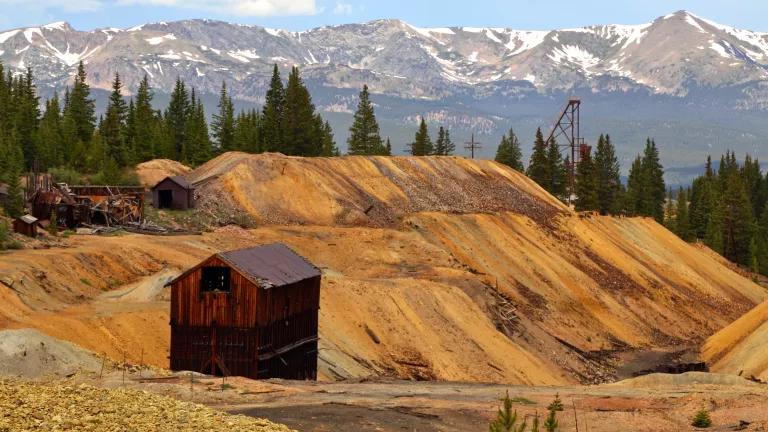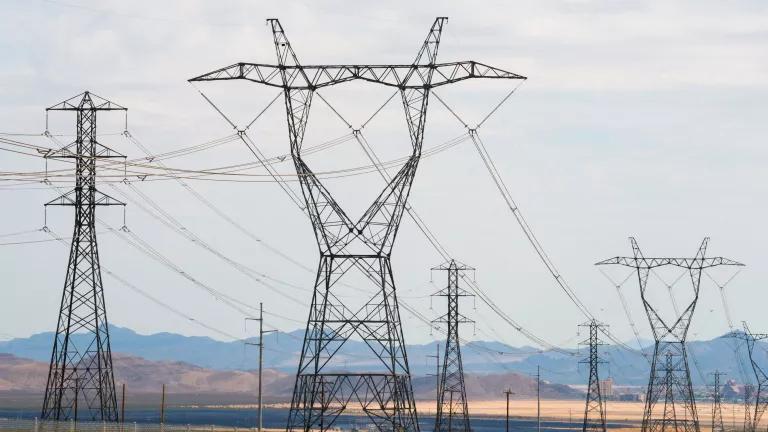Vote “Yes” on Nevada Question 6
Whether we vote by mail, early, or in-person on Election Day, Nevadans have a lot to consider this fall.

The 458-megawatt Copper Mountain Solar 1 (at left), and 64-megawatt Nevada Solar One (at right) plants, south of Boulder City, Nevada, with the Las Vegas Strip in the background.
Update: voters passed Question 6 with around 58 percent of the vote, meaning it now is part of the Nevada Constitution!
Whether we vote by mail, early, or in-person on Election Day, Nevadans have a lot to consider this fall. It’s critical that we not overlook the final item on our ballots: Question 6. While this clean energy ballot measure passed overwhelmingly in the 2018 election, voters must say “yes” one more time before it can become part of our state constitution. This constitutional amendment would require that power companies get at least 50 percent of their electricity from renewable sources like solar, geothermal, and wind, by 2030.
This type of policy is called a renewable portfolio standard or “RPS,” for short. Back in 2019, lawmakers unanimously passed, and Governor Sisolak signed, strong RPS legislation. We’re lucky to have climate champions in the Governor’s Office and legislature, but we know that’s not a guarantee in the future. To make sure that Nevada continues to move toward clean energy, no matter who is in office, we need to affirm our commitment to renewable resources and pass Question 6.
More renewables mean more solar, more jobs, lower emissions
Nevada has already warmed by two degrees Fahrenheit in the last century—a reality that is already having bad consequences for health and safety, especially for people who are most sensitive to air pollution, work outdoors, or have low incomes. This warming has led to diminished snowpack, severe drought, and increased wildfires, and has combined with the urban heat island effect to cause extreme heat in Nevada’s cities. According to Climate Central, Las Vegas is the fastest warming city in the country: the average temperature has increased by 5.8°F since 1970.
The first and most important thing Nevada can do to reduce climate-warming emissions is to switch its electricity system from running primarily on fossil fuels (right now, about 70 percent of electricity generation in the state comes from gas) to running primarily on renewable sources like solar, geothermal, and wind. Switching to more clean energy is important to reducing emissions and also paves the way for other crucial changes, like switching to electric vehicles and new efficient, electric home heating options.
With few fossil fuel resources of our own, Nevada imports fossil fuels from other states at a cost of more than $700 million a year. What we do have are world-class solar and geothermal resources, and using those instead of out-of-state fossil fuels creates jobs in-state. NRDC analysis conducted in advance of the 2018 election found that the state would add eleven thousand full-time jobs and reduce climate-warming emissions by 13 percent by 2030 with a 50 percent renewable portfolio standard in place, compared to continuing with the fossil fuel-fired business-as-usual.
Question 6 prevents backsliding and allows lawmakers to go further
Political winds can always shift, and powerful interests are creative at finding ways to get out of standards that apply to them (just read, as I am currently, political scientist Leah Stokes’ book on the history of state clean energy standards). The clear language of Question 6 in the Nevada Constitution will help us fight back against any future attempts to weaken the RPS. It’s also important to note that the renewable portfolio standard in Question 6 is a minimum standard: if it passes, lawmakers are free to require more from power companies in the future.
Question 6 is an insurance policy
I voted for Question 6 when I voted early on October 17. Having fought in the legislature for an increased RPS, I can attest that Question 6’s simple requirements helped us pass a good bill. Having it in the Constitution will be a good, no-risk insurance policy against political changes or special interests.




